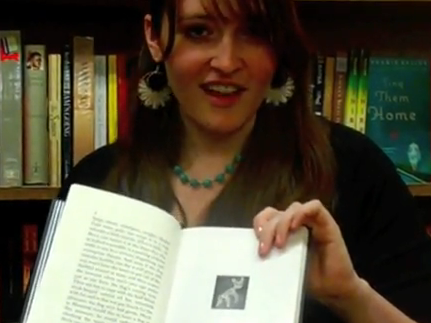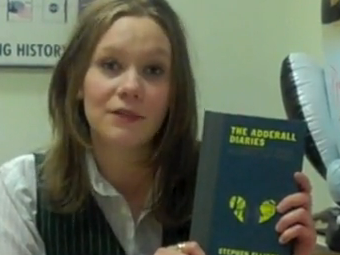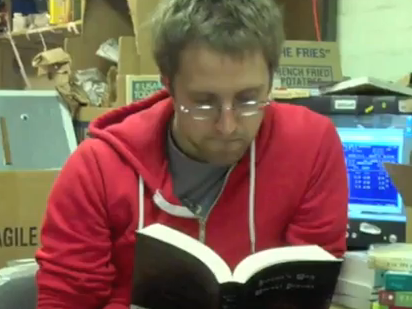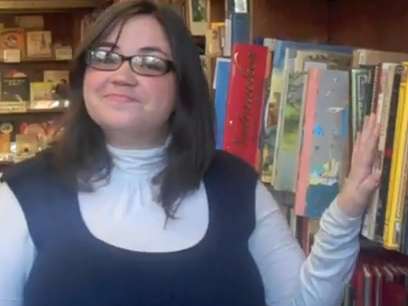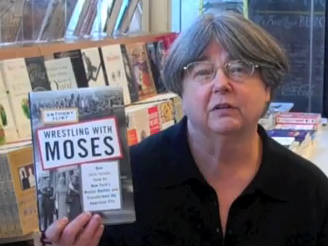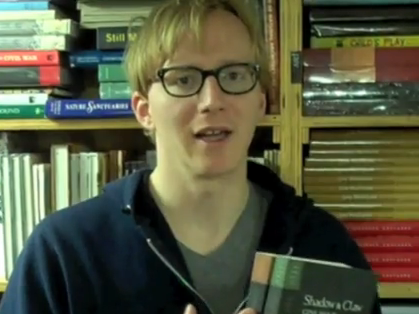|
Harvard Book Store Channel |
-
September 28, 2012
Steven Johnson
discusses Future Perfect: The Case For Progress In A Networked Age -
September 28, 2012
Natalie Hopkinson
discusses Go-Go Live: The Musical Life and Death of a Chocolate City -
September 21, 2012
Daniel Kantstroom
discusses Aftermath: Deportation Law and the New American Diaspora -
March 7, 2012
The Future of Black Politics
A panel discussion with Michael Dawson and William Julius Wilson, moderated by Eugene Rivers -
October 18, 2011
Ron Suskind
discusses Confidence Men: Wall Street, Washington, and the Education of a President -
March 4, 2011
Maya Jasanoff
discusses Liberty's Exiles: American Loyalists in the Revolutionary World -
February 25, 2011
Siva Vaidhyanathan
discusses The Googlization of Everything (And Why We Should Worry) -
February 24, 2011
Dani Rodrik
discusses The Globalization Paradox: Democracy and the Future of the World Economy -
February 18, 2011
Izzeldin Abuelaish
discusses I Shall Not Hate: A Gaza Doctor's Journey on the Road to Peace and Human Dignity -
February 17, 2011
Parag Khanna
discusses How to Run the World: Charting a Course to the Next Renaissance -
February 14, 2011
Dambisa Moyo
discusses How the West Was Lost: Fifty Years of Economic Folly and the Stark Choices Ahead -
February 10, 2011
Daniel Rasmussen
discusses American Uprising: The Untold Story of America's Largest Slave Revolt -
February 4, 2011
Sherry Turkle
discusses Alone Together: Why We Expect More from Technology and Less from Each Other -
January 27, 2011
Robert and Ellen Kaplan
discuss Hidden Harmonies: The Lives and Times of the Pythagorean Theorem -
January 24, 2011
Seth Mnookin
discusses The Panic Virus: A True Story of Medicine, Science, and Fear -
January 22, 2011
Christian Lander
discusses Whiter Shades of Pale: The Stuff White People Like, Coast to Coast, from Seattle's Sweaters to Maine's Microbrews -
January 14, 2011
Richard Wolffe
discusses Revival: The Struggle for Survival Inside the Obama White House -
December 7, 2010
Chris Kimball
The cast of America's Test Kitchen discusses their Healthy Family Cookbook -
November 3, 2010
The Best American Short Stories 2010
Series editor Heidi Pitlor joins guest editor, Richard Russo, and contributors Brendan Mathews and Steve Almond -
November 1, 2010
Gal Beckerman
Gal Beckerman discusses When They Come for Us, We'll Be Gone: The Epic Struggle to Save Soviet Jewry -
October 26, 2010
The Best American Essays 2010
Series editor Robert Atwan joins contributors John Summers and Jerald Walker -
October 25, 2010
Robert Kaplan
Robert Kaplan discusses Monsoon: The Indian Ocean and the Future of American Power -
October 15, 2010
Timothy Snyder
Timothy Snyder discusses Bloodlands: Europe Between Hitler and Stalin -
September 23, 2010
Guillermo del Toro and Chuck Hogan
Guillermo del Toro and Chuck Hogan discuss The Fall -
April 17, 2010
Mark Oppenheimer
Mark Oppenheimer discusses Wisenheimer: A Childhood Subject to Debate -
March 23, 2010
Christopher Hitchens and Rabbi David Wolpe
Christopher Hitchens and Rabbi David Wolpe weigh in on The Great God Debate -
February 17, 2010
Kevin Sampsell and Justin Taylor
Kevin Sampsell and Justin Taylor discuss A Common Pornography and Everything Here is the Best Thing Ever -
February 8, 2010
John Callahan and Adam Bradley
John Callahan and Adam Bradley discuss Ralph Ellison's Three Days Before the Shooting -
February 2, 2010
Rebecca Newberger Goldstein
Rebecca Goldstein discusses 36 Arguments for the Existence of God: A Work of Fiction -
January 8, 2010
Mika Brzezinski and Joe Scarborough
Mika Brzezinski and Joe Scarborough discuss All Things at Once -
December 3, 2009
Harry Evans and Jason Epstein
Harry Evans and Jason Epstein discuss My Paper Chase and Eating -
October 29, 2009
Harriet Reisen
Harriet Reisen discusses Louisa May Alcott: The Woman Behind Little Women -
October 23, 2009
Thomas Cathcart
Thomas Cathcart discusses Heidegger and a Hippo Walk Through Those Pearly Gates
-
December 19, 2013
Don’t Watch This If You Are a Bookseller’s Cousin or Mom
What is our discerning staff giving for the holidays? -
September 22, 2011
Minimum Paige: A Harvard Book Store Comic Anthology
A project this heroic could only be accomplished by the most dynamic of duos. -
September 16, 2011
Lucy the Wonder-Pup Picks the Booker
Can this adorable puppy predict the winner of the Man Booker Prize? -
January 21, 2011
HBTV Presents: Jurassic Books
A short film that ponders the possibilities of a large scale book printing robot... -
January 14, 2011
HBTV Is On The Air!
Cambridge's only local, fictional television station that's based out of an independent book store. -
September 8, 2010
Carole
recommends Wrestling with Moses and The Death and Life of Great American Cities
| Gift Cards |
-
Add a gift card to your order!

-
Not in Our Lifetimes: The Future of Black Politics
by Michael C. DawsonOur Price $26.00Hardcover
On Its Way
-
More than Just Race: Being Black and Poor in the Inner City (Issues of Our Time)
by William Julius WilsonOur Price $24.95Hardcover
On Its Way
The Future of Black Politics
Harvard Book Store and Boston Review welcome professors MICHAEL DAWSON and WILLIAM JULIUS WILSON and the Reverend EUGENE RIVERS for a discussion on The Future of Black Politics, the subject of Boston Review's January/February 2012 issue.
Michael Dawson's most recent book is Not in Our Lifetimes: The Future of Black Politics. In the aftermath of Hurricane Katrina, polls revealed that only 20 percent of African Americans believed that racial equality for blacks would be achieved in their lifetime. But following the election of Barack Obama, that number leaped to more than half. Did that dramatic shift in opinion really reflect a change in the vitality of black politics—and hope for improvement in the lives of African Americans? Or was it a onetime surge brought on by the euphoria of an extraordinary election? Dawson shows definitively that it is the latter: for all the talk about a new post-racial America, the fundamental realities of American racism—and the problems facing black political movements—have not changed. Polemical but clear-eyed, passionate but pragmatic, Not in Our Lifetimes will force us to rethink our easy assumptions about racial progress—and begin the hard work of creating real, lasting change.
With More than Just Race: Being Black and Poor in the Inner City, William Julius Wilson explains a groundbreaking new framework for understanding racial inequality, challenging both conservative and liberal dogma. In this timely and provocative contribution to the American discourse on race, William Julius Wilson applies an exciting new analytic framework to three politically fraught social problems: the persistence of the inner-city ghetto, the plight of low-skilled black males, and the fragmentation of the African American family. Though the discussion of racial inequality is typically ideologically polarized. Wilson dares to consider both institutional and cultural factors as causes of the persistence of racial inequality. He reaches the controversial conclusion that while structural and cultural forces are inextricably linked, public policy can only change the racial status quo by reforming the institutions that reinforce it.
Michael C. Dawson is the John D. MacArthur Professor of Political Science and the College at the University of Chicago and the founding and current Director of the Center for the Study of Race, Politics, and Culture at the university. He is the author of Black Visions and Behind the Mule: Race, Class, and African American Politics.
William Julius Wilson is Lewis P. and Linda L. Geyser University Professor at Harvard University. He is one of only 22 University Professors, the highest professional distinction for a Harvard faculty member. After receiving a Ph.D. from Washington State University in 1966, Wilson taught sociology at the University of Massachusetts Amherst, before joining the University of Chicago faculty in 1972. In 1990 he was appointed the Lucy Flower University Professor and director of the University of Chicago's Center for the Study of Urban Inequality. He joined the faculty at Harvard in July 1996. He is affiliated with the Malcolm Wiener Center for Social Policy at the John F. Kennedy School of Government.













































































































































































































































